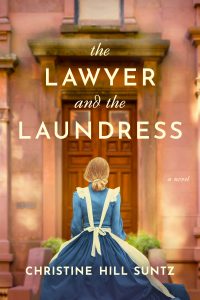Author Christine Hill Suntz is our guest blogger, and you’ll learn more from her about her new historical romance, The Lawyer and the Laundress.
In this marriage-of-convenience romance, lawyer James isn’t looking for love, while laundress Sara doesn’t want to be found. When their paths cross in a British colony on the brink of rebellion, a marriage of convenience may be their best hope of survival.
Read why Christine set her debut novel during a short-lived Canadian rebellion and why she thinks this book about a tumultuous time in history is relevant to readers today.
If you want to learn more about Christine’s novel, get access to the entire first chapter of The Lawyer and the Laundress, or find your own copy in softcover, e-book, or audiobook at a retailer near you.
I set my debut novel, The Lawyer and the Laundress, in Toronto in 1837. The year and the place are no accidental choice. In 1837, Toronto was the site of the short-lived Upper Canada Rebellion, a home-grown attempt to overthrow British control of the colony and replace it with a more equitable democracy.
Every Canadian child learns about the Upper Canada Rebellion in school, and it has lived in my imagination for years. On December 7, 1837, after months of discontent, a group of settlers, mostly farmers, came together at an inn north of Toronto under the leadership of William Lyon Mackenzie, a fiery Scot whose rhetoric united them against the injustices perpetrated by the ruling class.
Inequitable land grants, poor infrastructure and lack of representation in government angered many newcomers. These men and women hadn’t uprooted their families and spent their life’s savings to come to Canada, only to serve as servants and farm laborers to an elite ruling class. They had grander goals. They wanted to own their own land, educate their children. Vote in elections and know their vote would mean something.
While their motives were just and their leaders genuine, poor organization, communication, and training doomed the rebellion to failure. It fizzled out after only a few days, leaving 3 men dead and many others on the run.
Despite its ignoble end, to me, the rebellion has always seemed like a momentous and tragic part of our history. I felt for the idealistic rebels who tried to bring about positive change in all the wrong ways. They were dreamers and reformers, not soldiers. Ultimately, many of them paid a steep price for daring to stand up to an unjust social order that favored the rich and influential and aimed to keep the poor in their place.
As part of my research, I read newspapers from the time. I thought modern media was polarized until I read editorials from 1837. The partisan, emotional and vilifying rhetoric of both rebels and loyalists could only have inflamed anger and driven the sides further apart and closer to violence.
My main characters, James and Sara, became people who could see both sides of the issues of the day and who understood how to lead with compassion. James, in particular, battles the forces of extremism on either side of the political spectrum. He attempts to walk a line, to show others that solutions and progress come from respectful discussion, compromise, and thoughtful, incremental change.
I grew up in and still belong to a historic peace church where shared experience and discussion are the way to move through conflict in peace and love. Did I intend to incorporate these themes into my historical romance? No. I just wanted to write a romance set at an exciting moment in Canadian history. Did they emerge, nonetheless? I think so.
These are challenging times for the relationship between America and Canada. I so appreciate the readers who take the time to read about this little-known slice of Canadian history. It’s through conversations like this that we learn about each other. I was recently chatting with a good friend from Virginia, and she said something that really stuck with me. “I believe even more strongly than ever in the need for people to stay connected to one another.”
I hope this story can help us stay connected. Happy reading!

Canada, 1837. Widower James Kinney knows his precocious daughter, Evie, needs more than his lessons on law and logic, but Toronto offers few options. Classes with the neighbor children seem ideal until James discovers Evie is secretly spending her time with Sara O’Connor, a kind and mysteriously educated servant. For propriety’s sake, James forbids their friendship. But then Evie falls victim to the illness ravaging the city, and James must call upon Sara’s medical knowledge and her special bond with Evie to save his daughter’s life.
When Sara’s presence in his household threatens scandal, however, James offers an unexpected solution: become his wife, in name only, and help him raise Evie to be a proper young lady.
If Sara can ignore the sparks she feels when they’re together, his logical proposal could keep her secret secure forever. But soon, the forces of rebellion unravel their tidy arrangement. When James is accused of treason, Sara must find the courage to face a past that could save her husband’s life.

Christine Hill Suntz knew she wanted to write as soon as she finished Anne of Green Gables, and she’s been lost in her imagination ever since. Her love of language led her to study French and German and to pursue a graduate degree in comparative literature, before finding a home teaching high school French.
In 2022, she won the ACFW Genesis Contest and the West Coast Christian Writers Goldie Award for best fiction writing, and she was a finalist in the 2023 ACFW Genesis Contest. She lives in Ontario on a hobby farm with her family, a flock of nosy hens, one attack rooster, and a herd of entitled goats. When she’s not writing or teaching, she loves to try out historical recipes on her (mostly) willing family. Follow her adventures in writing and historical farming at christinehillsuntz.com or on Instagram at christinehillsuntz.



